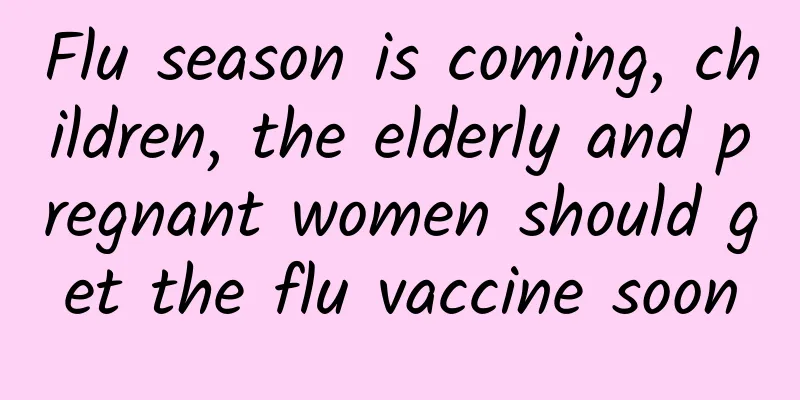Flu season is coming, children, the elderly and pregnant women should get the flu vaccine soon

|
As September begins, with the opening of universities, colleges, primary and secondary schools, and kindergartens, a large number of students and personnel are moving and gathering, which puts higher demands on the normalization of epidemic prevention and control. At the same time, October to May of the following year is the peak season for influenza. This autumn and winter, influenza virus and new coronavirus are likely to be "double-virus superimposed", and epidemic prevention and control will face more severe challenges. Recently, Wu Zunyou, chief epidemiologist at the Chinese Center for Disease Control and Prevention, said that the overlap between influenza and COVID-19 prevention and control will make it difficult for medical staff to make differential diagnoses, increase the difficulty of isolation and medical burden, and be detrimental to epidemic prevention and control. The most effective way is to vaccinate key populations with influenza vaccines as soon as possible. Wang Chen, an academician of the Chinese Academy of Engineering and an expert in respiratory and critical care medicine, and other medical experts also suggested that influenza vaccines should be widely vaccinated in a timely manner and the vaccination population should be expanded to a greater extent; key populations such as children, the elderly, and pregnant women should be vaccinated with influenza vaccines as soon as possible, preferably before October. To prevent the "double virus" of influenza and COVID-19, the influenza vaccination time is advanced this year Although it is still September, the flu vaccine has become a hot topic among many parents of students recently. The reporter conducted a random survey and found that parents who were very cautious about giving their children flu vaccines in the past have a very different attitude this year. "I am more afraid of getting the flu this year than ever before," said Ms. Liu from Beijing. In previous years, when her child's school notified her of the unified flu vaccination, she would hesitate whether to vaccinate her child. This year, she will not hesitate anymore. Not only will the child be vaccinated, but the whole family will also go to the community hospital for vaccination. Many parents of Beijing Xicheng Foreign Language School and two surrounding primary schools said that they must vaccinate their children with the flu vaccine this year. Many parents have already lined up at the hospital to make an appointment for the adult flu vaccine. According to Ali Health, in the past month, the keyword search for "flu vaccine" on the Tmall platform has increased by more than 7 times year-on-year. In previous years, influenza vaccination generally started in October. This year, due to the impact of the COVID-19 epidemic, many places across the country have advanced the time of influenza vaccination. At present, many cities have gradually entered the vaccination stage for the general population. For example, Qingdao City has started influenza vaccination in late August. Many parents who take their children to the injection make appointments half a month or even a month in advance. In order to avoid crowds, various places have also made corresponding arrangements, including providing more vaccination sites and times, and making vaccination appointments. For example, the Linhe Community Health Service Center in Changchun Economic and Technological Development Zone, Jilin Province, used to only be able to vaccinate in the morning. Due to the large number of influenza vaccinations, it also opened a special time period in the afternoon. Starting from August 26, Ali Health launched a family-friendly influenza vaccination appointment service in 25 cities across the country, including Beijing, Shanghai, Guangzhou, Shenzhen, Chengdu, Hangzhou, Chongqing, and Tianjin. Experts from the CDC said that influenza can cause systemic symptoms such as fever and body aches, which poses a risk that the individual's health portal is opened and other diseases may take advantage of the opportunity to enter. Since the symptoms of influenza and COVID-19 are very similar, a large number of patients flock to hospitals every flu season, which makes it more difficult for medical staff to make differential diagnoses and is not conducive to epidemic prevention and control. Therefore, this year people pay more attention to influenza and influenza vaccines than in previous years. Pregnant women and children over 6 months old should be vaccinated against influenza, but infants under 6 months old and those who are allergic to the vaccine should not be vaccinated. Recently, the Chinese Center for Disease Control and Prevention organized experts to compile and issue the "Technical Guidelines for Influenza Vaccination in China (2020-2021)". In light of the ongoing global spread of the COVID-19 epidemic, the following groups are recommended as priority vaccination targets in 2020-2021: 1. Medical personnel, including clinical treatment personnel, public health personnel, and health quarantine personnel; 2. Vulnerable groups and employees in places where people gather, such as nursing homes, long-term care institutions, and welfare homes; 3. People in key places, such as teachers and students in childcare institutions, primary and secondary schools, and inmates and staff in prisons; 4. Other high-risk groups for influenza, including home-based elderly people aged 60 and above, children aged 6 months to 5 years, patients with chronic diseases, family members and caregivers of infants under 6 months old, and pregnant women or women who are preparing to become pregnant during the influenza season. 5. People aged ≥6 months and without contraindications can receive influenza vaccines. Experts remind that since the flu vaccine for children aged 6 months to 3 years needs to be given in two injections, with a 4-week interval, it needs to be given earlier. If you miss the best time to get vaccinated, as long as you get vaccinated during the entire flu season, you can still benefit from it even if it is late. In addition, Zhang Wenhong, head of the Shanghai COVID-19 Clinical Treatment Experts Group and director of the Infectious Diseases Department of Huashan Hospital, reminded that children over 6 months old and adults should receive influenza vaccinations every year, but children under 6 months old are not suitable for influenza vaccinations, and those who may have severe and fatal allergies to influenza vaccine ingredients are not recommended for vaccination. Children who are allergic to eggs and vaccine ingredients, children with a history of Guillain-Barré syndrome, and children who are unwell before vaccination should consult a doctor before vaccination. In addition, there may be some adverse reactions to the flu vaccine such as soreness, redness, swelling and low fever at the injection site, but most of the symptoms are mild and can be recovered within 1 to 2 days; a very small number of people may experience serious adverse reactions, such as severe allergic reactions. Flu vaccines need to be administered every year, but getting the vaccine does not mean you won’t catch a cold According to the reporter, the influenza vaccines currently approved for marketing in my country include trivalent inactivated influenza vaccine (IIV3) and quadrivalent inactivated influenza vaccine (IIV4). IIV3 includes split vaccine and subunit vaccine, and IIV4 is split vaccine. Experts point out that annual influenza vaccination is the most effective means of preventing influenza, which can significantly reduce the risk of influenza and serious complications in the recipients. Disease control experts remind that the flu vaccine is not a one-shot lifelong vaccine and needs to be administered every year. First, the immunity acquired after a person is infected with the flu virus or vaccinated with the flu vaccine will decay over time. Evidence suggests that the protective effect of the inactivated flu vaccine against antigenically similar strains can last for 6 to 8 months; serum antibody levels significantly decrease one year after vaccination. Second, because the antigenicity of the influenza virus is variable, in order to match the constantly mutating influenza virus, the World Health Organization will update one or more strains of the influenza vaccine components recommended in most seasons. Therefore, in order to ensure that the vaccinated population is protected to the greatest extent, even if the influenza vaccine components are exactly the same as the previous season, given that the antibody titers of most vaccine recipients have significantly decreased, it is still recommended to be vaccinated before the flu season of the year. Generally speaking, flu vaccination can reduce the incidence of flu by about 80% during the flu season and can significantly reduce the severity of flu. However, due to the variability of flu viruses, flu vaccination can only protect the human body from being infected by the flu virus targeted by this year's flu vaccine, and cannot guarantee that it will not be invaded by other flu viruses or the common cold. Therefore, flu vaccination cannot completely guarantee that we will not get the flu, let alone catch a cold. Therefore, even children and adolescents who have received the flu vaccine should still pay attention to daily protection, wash their hands frequently, wear masks, avoid rubbing their eyes, and try to avoid crowded and noisy places during the flu season. Liu Xiaoju, a member of the Standing Committee of the Chinese Medical Association's Respiratory Diseases Branch, said that people cannot directly distinguish between influenza and COVID-19 based on symptoms alone, so many parents are very scared when they hear their children coughing or having a fever. Ding Yijun, a neonatologist at Beijing Children's Hospital, pointed out that autumn and winter are the peak seasons for common respiratory infectious diseases such as influenza and pneumonia. "It doesn't mean that as long as there is a cough or fever, it must be influenza or COVID-19. But if a child has fever symptoms, whether at school or at home, he must seek medical attention in time, and then notify the school and teacher." Ding Yijun reminded parents that influenza is not a common cold. It is a highly contagious disease that spreads quickly. The best time to treat it is within 48 hours. The main symptoms of influenza are persistent high fever, muscle aches and fatigue, and some cases are accompanied by cough, sore throat, and digestive tract symptoms. Once a child has similar symptoms, he must go to the hospital for treatment and investigation in time to avoid delaying the disease and causing severe pneumonia. |
Recommend
What to do if you have uterine prolapse during pregnancy? Chinese and Western medicine treatment is effective
The main reason for uterine prolapse after pregna...
How long does it take for Qianjin Tablets to take effect?
According to statistics from the National Health ...
Does hyacinth bloom only once? How to cut hyacinth after it blooms?
As people's quality of life improves, more an...
Which is better for women: sterilization or IUD?
After giving birth, some women have no desire to ...
What to do if you have stomach discomfort during pregnancy
After pregnancy, women often experience a lot of ...
What soup to drink after menstruation to replenish qi and blood
In fact, after menstruation, many female friends ...
How much do you know about urinary stones?
This is the 3798th article of Da Yi Xiao Hu Has a...
Can pregnant women eat guava?
Guava is a fruit that is popular with many people...
What to do if your milk supply suddenly runs low
Postpartum mothers generally have to take on the ...
After the abortion, there is still 12 times 8
After medical abortion, when you go to the hospit...
How much hcg can rule out fetal arrest
Hcg is a sex hormone that only occurs in women. T...
Vaginal opening is too small
Female friends probably cannot observe another wo...
Why does a woman's vagina have an odor?
The odor of the lower body is quite common among ...
What to do if you have vulvar itching during early pregnancy
In the early stages of pregnancy, expectant mothe...
What are the causes of hair loss in middle-aged women?
More and more middle-aged women are beginning to ...









